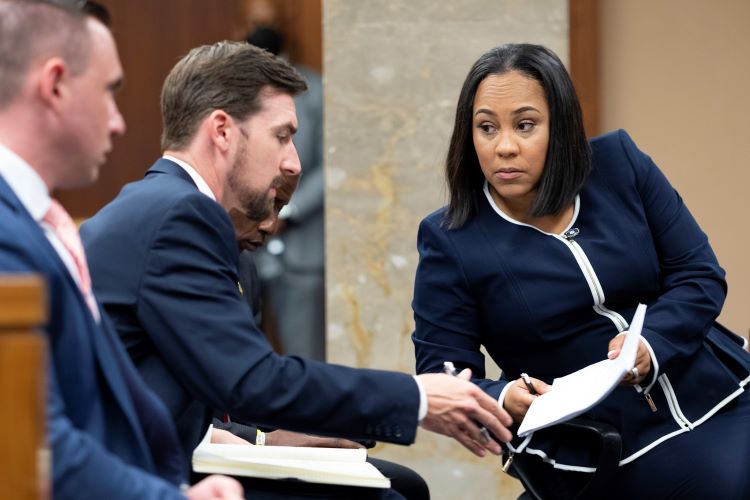Trump motion seeks to block evidence from Georgia special purpose grand jury, disqualify district attorney

Fulton County District Attorney Fani Willis talks with a member of her team during proceedings to seat a special grand jury in Fulton County, Georgia, in May 2022 to look into the actions of former President Donald Trump and his supporters who tried to overturn the results of the 2020 election. The hearing took place in Atlanta. Photo by Ben Gray/The Associated Press.
Lawyers for former President Donald Trump filed a motion Monday arguing that a special purpose grand jury investigating possible election interference in Georgia was created under statutes that are unconstitutionally vague, inviting “arbitrary, amorphous enforcement.”
The motion seeks to quash the report of a special purpose grand jury, to bar use of evidence arising from the grand jury, and to disqualify Fulton County, Georgia, District Attorney Fani T. Willis from involvement in the case.
Law360, Reuters, the New York Times and Georgia Public Broadcasting have coverage.
The central constitutional concern is whether special purpose grand juries are civil or criminal bodies, the legal filing says. The supervising judge declared that the grand jury in the election case is criminal but offered no basis for the conclusion, Trump’s lawyers say.
The legal filing also said Willis was “a biased prosecutor with a personal interest” who used the investigation to promote her political campaign. The jury foreperson “engaged in a media tour” in which she talked about her experience, while the supervising judge also gave “numerous media interviews.”
Statements by the foreperson and other grand jurors indicated that they were allowed to read news coverage about the investigation, and they drew negative inferences when witnesses invoked the Fifth Amendment. The comments make it apparent that grand jurors were “improperly supervised or, worse, improperly instructed from the outset,” the motion says.
Part of a report by the special grand jury released in February said some witnesses may have lied under oath during their testimony. The grand jury was investigating whether Trump or anyone else violated Georgia law by seeking to overturn the 2020 presidential election.
Trump had called Georgia’s secretary of state after the election and asked whether he could “find” 11,780 votes, which would change Trump’s loss in Georgia to a win.
Clark D. Cunningham, a law and ethics professor at Georgia State University, told the New York Times that the motion was prematurely filed.
Trump should make his arguments “when (and if) he is actually indicted,” Cunningham told the New York Times in an email.
See also:
ABAJournal.com: “Top Texas court questions subpoena efforts by Georgia grand jury probing efforts to overturn 2020 election”
ABAJournal.com: “Rudy Giuliani is ordered to testify before Georgia grand jury probing attempts to overturn 2020 election”
Write a letter to the editor, share a story tip or update, or report an error.



